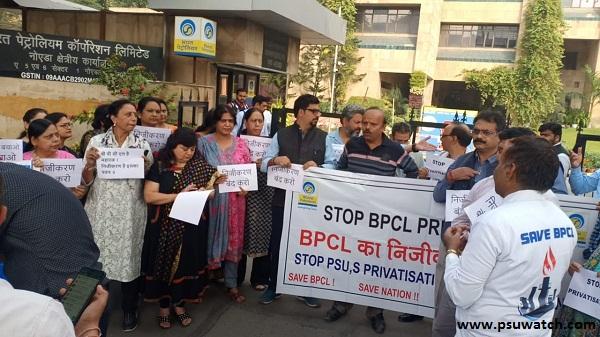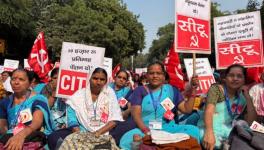Unions Protest Privatisation of PSUs, To Strike On November 28

Image Courtesy: PSU Watch
As the Modi government intensified its selling spree of national assets, the Central Trade Unions in India have jointly opposed the privatisation of three profit-making central public sector undertakings (CPSUs)—Bharat Petroleum Corporation Limited (BPCL), Shipping Corporation of India Limited (SCI), and Container Corporation of India Ltd (CONCOR).
The unions have also lent full support to the one-day token strike by the workers of BPCL and other oil refinery companies on November 28.
On November 20, the Cabinet Committee on Economic Affairs (CCEA) under the Modi-led BJP government gave approval to the sale of the entire central government stake in BPCL—despite ongoing protests by the oil company employees—and SCI as well as the majority stake in CONCOR. The government is also transferring management control of these three companies to the prospective private buyers.
The government holds 53.29% stake in BPCL and 63.75% stake in Shipping Corporation.
However, the sale of BPCL will not include its shareholding in the Assam-based Numaligarh Refinery Limited (NRL). BPCL holds 61.65% stake in NRL, which will be sold later to a public-sector oil and gas company, said a government statement.
In CONCOR, the Modi regime is selling 30.8% of the government stake, while retaining 24% but giving away management control.

As of November 20, the government’s shareholding that is being sold in the three companies was worth approximately Rs 76,000 crore.
On the same day, the government also announced the disinvestment of two public-sector power companies—North Eastern Electric Power Corporation Limited (NEEPCO) and hydro-power company THDC Limited—which would be sold to another public-sector company, NTPC Limited, the country’s largest energy conglomerate.
It is reported that the NTPC might pay up to Rs 10,000 crore for the central government’s stake in these two unlisted companies—helping the government inch closer to its disinvestment target of Rs 1.05 trillion for 2019-20.
While the Modi government exceeded its disinvestment targets of Rs 1 lakh crore in FY18 and Rs 80,000 crore in FY19, by the end of September in the current financial year, the government had raised Rs 12,359 crore through asset sales.
As per news reports, the Cabinet on November 20 also accorded ‘in-principle’ approval for the reduction of the government’s stake to below 51% in a number of other PSUs, although the final list of names has not been revealed yet.
“Post such reduction, government’s control will remain intact and, while retaining the management control, on a case-to-case basis decision will be taken,” Finance Minister Nirmala Sitharaman told the media after the Cabinet meeting.
Meanwhile, 21 unions of workers belonging to three public-sector oil refinery companies—BPCL, HPCL and MRPL—have served strike notice for November 28. The unions are working hard to make the token strike a success, as announced during the national convention of oil sector workers held on November 20.
Following the Cabinet’s approval to the sale of the above-mentioned PSUs, on November 21, 10 central trade unions—INTUC, AITUC, HMS, CITU, AIUTUC, TUCC, SEWA, AICCTU, UTUC and LPF—issued a joint statement registering their “strong protest”.
They expressed their “utter annoyance at the disastrous decisions” of the Modi government to privatise the “excellently run cash-rich” central government companies.
“Apart from the above CPSUs, the other targets of privatisation onslaught are, reportedly, Indian Oil (current government stake 51.5 per cent), NTPC (54.50 per cent), Bharat Electronics (58.83 per cent), BEML (54.03 per cent), Engineers India (52 per cent), GAIL (52.66 per cent) and National Aluminium Co (52 per cent),” said the joint statement.
The central trade unions noted that the “recent economic ‘bailout packages’ presented by the Government mainly to benefit the big business houses shall cost the Exchequer of the country a huge amount of Rs.1.45 lakh crore.” And while more such packages are being considered by the Modi government, “now to make good the revenue loss, the Government has resorted to selling out CPSUs with huge physical and financial assets.”
“Shockingly,” said the joint statement, “the Government is turning blind eye to the fact that privatization of CPSUs is bound to inflict revenue loss on account of loss of huge amount of taxes, duties and dividend payment by these CPSUs.”
Demanding that the Modi government reverse the decision to privatise these companies, the unions said workers had been conducting various campaigns, propaganda and agitation activities to make the strike on November 28 a “grand success”.
The central trade unions also appealed to all CPSU workers—“irrespective of affiliation”—to join hands and organise protest actions against the privatisation decisions of the Modi-led BJP government.
“Given the aggressive desperation of the Government to eliminate public sector from the economic map of India, it is felt that the need of the hour is to urgently activate the United Platform of CPSU Worker to chalk out appropriate Nationwide long-drawn struggles,” they said.
Get the latest reports & analysis with people's perspective on Protests, movements & deep analytical videos, discussions of the current affairs in your Telegram app. Subscribe to NewsClick's Telegram channel & get Real-Time updates on stories, as they get published on our website.























